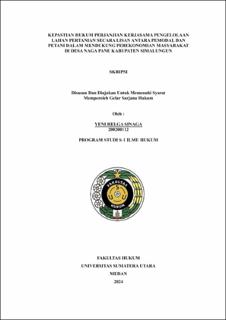| dc.description.abstract | This research aims to analyze aspects of legal certainty in the practice of cooperation agreements made orally as well as dispute resolution mechanisms that arise as a result of these agreements. The main focus of the research is to examine the strength and legal certainty of oral agreements between financiers and farmers, especially in Naga Pane Village, as well as the ways of dispute resolution that occur in the village community related to oral agreements.
This research uses normative legal methods supported by empirical data. Desk research is conducted to obtain secondary data that includes primary, secondary, and tertiary legal materials. In addition, field research was also conducted through observation and interviews to collect empirical data related to the practice of oral agreements in the community. The data collected was then analyzed descriptively to provide a more comprehensive picture of the issues discussed, as well as to explain how the application of customary law plays a role in resolving oral agreement disputes in the village. The results showed that oral cooperation agreements are a very common practice in Naga Pane Village. Villagers, especially farmers and financiers, prefer this form of agreement because it is considered easier to do, does not require administrative costs, and is in accordance with long held local traditions. In the event of a dispute, settlement is usually done on a family basis, through a mediation process facilitated by community leaders, the village head, and the Partuha Maujana customary institution. Dispute resolution is oriented towards restoring social relations, prioritizing traditional values and norms that have long developed in the community. | en_US |


